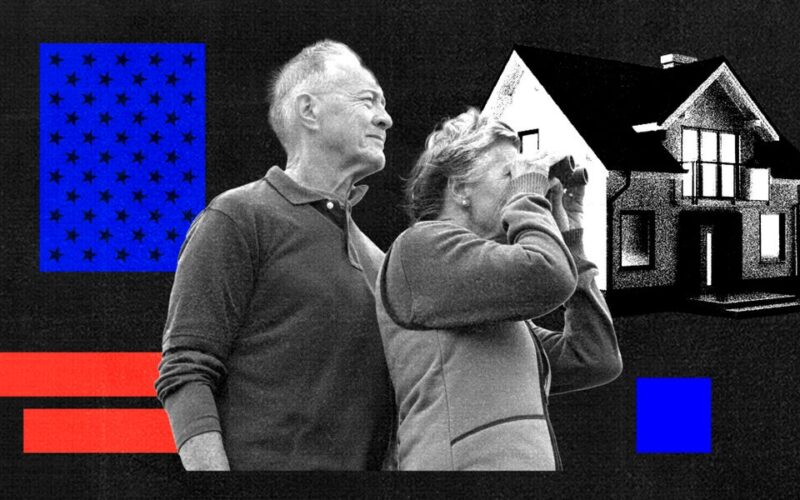- Baby boomer homeowners have benefited from skyrocketing housing prices amid a home shortage.
- But now they’re facing a shortage of accessible homes to retire in.
- Many older adults are now stuck in homes they’re increasingly struggling to live in and pay for.
Baby boomers have been the big winners in the US housing market, but as the generation retires, its members are facing a new challenge in finding accessible housing.
It’s a problem they had a hand in making.
Homeowners in the generation — now between 59 and 78 years old —have seen their home equity surge, particularly over the past decade, as a growing home shortage across the US has pushed home prices sky-high.
But as the generation approaches 80, boomers are beginning to suffer from their own housing woes: a severe shortage of accessible and affordable retirement homes. Compounding the housing issue are the rising costs of healthcare and elder care.
With mortgage rates and housing costs high and inventory scarce, many older people are staying put. Nearly 80% of home-owning baby boomers recently surveyed by Redfin said they’re planning to age in their current home. And as of 2022, empty-nest boomers owned twice as many homes with three or more bedrooms as millennials with kids. While some boomers simply don’t want to downsize or move, others can’t afford it or don’t have any feasible options.
“Is it aging in place or is it stuck in place?” said Jennifer Molinsky, the director of Harvard University’s Housing an Aging Society Program. “There’s a lot of people in the middle, homeowners included, who are stuck.”
Molinsky authored a report last year finding that the US didn’t have anywhere near enough housing and care services for boomers as they age.
Homeowners who oppose new and denser housing in their neighborhoods are a major reason so many American communities are short on homes. Those who oppose building are disproportionately older homeowners. While boomers didn’t create many of these not-in-my-backyard laws that restrict housing construction, in many cases, they’ve protected such regulations, dominating the attendance at community board meetings and fighting housing projects.
Boomers are struggling to find accessible, affordable homes amid rising costs
As people age, they tend to need more accessible homes with fewer stairs and wider hallways. As they stop driving, many also want to live in more walkable or transit-friendly places to access amenities and combat isolation.
But restrictive land-use laws, including those prohibiting apartment buildings in areas with single-family homes, have made accessible housing options harder to find in many of the communities boomers have called home for decades. Less than 4% of US homes have the three essential factors necessary for those with limited mobility: a single floor, wide hallways and doorways, and no steps to get in, the Harvard report found.
“There’s just such a diversity of households that we’re not really serving with the traditional single-family house,” Molinsky said.
Many older homeowners — particularly the growing number who still have mortgages — are struggling with rising insurance premiums. Nationally, home-insurance premiums rose by an average of 21% from May 2022 to May 2023, Policygenius, an insurance marketplace, found. Insurance companies are increasingly dropping customers and pulling out of entire regions, particularly those hardest hit by climate-related disasters.
The Harvard report noted that places retirees had flocked to in recent decades like South Florida and Arizona also face some of the most severe climate-related impacts, including regular flooding, fires, and extreme heat.
A record number of homeowners 65 and older are cost-burdened, meaning they spend more than 30% of their income on housing and utilities, the report found. This is particularly difficult for those on fixed incomes. As a result, older people are increasingly facing homelessness. Single adults 50 or older are now estimated to account for about half of the US homeless population, up from about 10% three decades ago.
Not all boomers have benefited from the spike in housing prices and home equity. Wealth among boomers is very unevenly distributed, including when it comes to housing. Older renters and homeowners of color tend to have much higher housing costs. Molinsky’s report found older Black homeowners had less than half the home equity of older white homeowners.
Molinsky said the shortage of homes appropriate for aging would hurt lower- and middle-income boomers and boomers of color the hardest.
“All of these things become much more pressing over the next few years when baby boomers turn 80,” Molinsky said. “There’s really no time to waste.”
Are you struggling to downsize or find a suitable home to retire in? Are you otherwise affected by the cost of retirement housing? Reach out to this reporter at erelman@businessinsider.com.
Source link
lol

